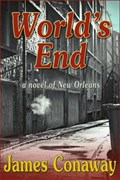The politics, organized crime, and affluence of the new South come together in World’s End, a parish below New Orleans where the continental United States slides into the Gulf of Mexico. World’s End abounds in oil, racial diversity, and political control as subtle and as absolute as that of a Latin American caudillo. It is bossed by the O’Neills, original Irish settlers in the lower Mississippi Valley. The dynasty is now in the hands of Rory O’Neill, whose patriarchal authority is reminiscent of Willie Stark’s in All the King’s Men, and his son and heir, Bo O’Neill.
As the story opens, Michael Duran, a former assistant district attorney in New Orleans, is summoned by Rory O’Neill and offered a political job raising funds for O’Neill’s candidate for governor, the well-born Strather Ward. O’Neill controls Ward because he knows of the one black mark on his record. O’Neill and the New Orleans district attorney are bitter enemies, but of greater significance is O’Neill’s hatred of the local Mafia, headed by Salvador Cinque, whose cruelly-efficient syndicate competes with the O’Neills.
World’s End (William Morrow) is a contemporary novel but much of the real world it captures was swept away by hurricane Katrina, so it’s nostalgically bitter-sweet as well. Intricately plotted, the novel works on several levels - as a family saga, a political thriller, a kind of generational noir, and a love story - and deals not just with power and the ever-changing South but also with the themes of faith, guilt, and retribution.
Passionate, unrelenting, hedonistic, violent, funny and, like the society it portrays, not devoid of beauty, World’s End is a complete and compelling literary experience and an ideal complement to the author’s other New Orleans novel, The Big Easy.
Novelist Michael Mewshaw wrote in the Washington Star when the novel was first published: “Conaway has written a saga which... leads to the conclusion that at the top - at the bottom? - the country is run by an interlocking directorate of corporate executives, mafiosi, elected officials and regional power brokers... What raises the book above its genre is Conaway’s sure knowledge of the place and its people... he knows, for instance, that racketeers in New Orleans wear elastic white socks as a kind of professional badge. And he can describe a Cajun celebration, a morning coffee at Cafe du Monde, or a ritualistic serving of Sambuca just a skillfully as he handles the action sequences.”
New York Daily News, “If tight melodrama laced with sex, power grabs and corruption is your dish, you’ll devour World’s End with the relish of a hungry mule in a cornfield...a spellbinder.”
Kirkus: “This Louisiana tale, with its Mafia crime barons pitted against corrupt-government barons, expertly lifts numerous Puzo-ian scenes and motifs - tit-for-tat violence, family honor - while adding some strong local colorations and cinematic effects... there’s enough action and avarice down among the bayous to make this a solid, never crass or tasteless, commercial entry.”
The Miami Herald: “There is a good deal more to World’s End than just politics. Conaway’s novel is at once a family chronicle, a thriller, and a brief history of Louisiana. It is filled with authentic detail and atmosphere, told with great skill.”
Philadelphia Inquirer: “The teaser on the jacket flap says that James Conaway’s new novel ‘will remind some readers of ‘All the King’s Men’ and others of ‘The Godfather’... The good news is that it’s an astonishingly successful hybrid.”
New Orleans Times-Picayune: “... fascinating and absorbing... one of those rare you-can’t-put-it-down books.”
Kansas City Star: “World’s End would be a much less successful novel without Conaway’s merging of action and place. So much that is ugly and crude occurs in the midst of so much beauty and graciousness, and Conaway makes us believe equally in both.”

